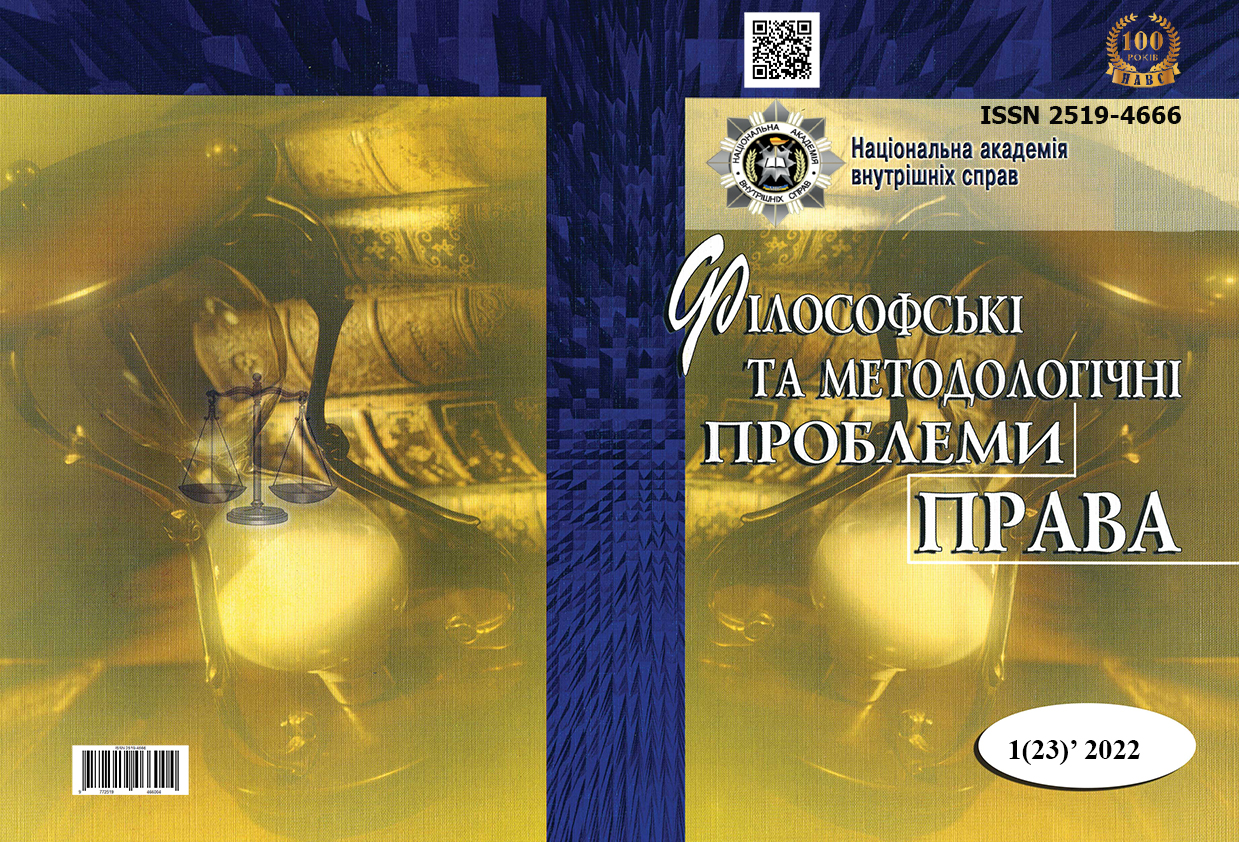The Need to use a Integrated Methodology in Modern Legal Science
Abstract
Topicality. Methodological support of legal knowledge is inextricably linked with the objective processes of integration of scientific knowledge at the present stage and the transition to holistic knowledge at the junction of philosophy, science, art, theology, esoterics, social sciences. The holistic knowledge of "About Everything" that was characteristic of the time of Pythagoras was developed and differentiated. Now comes the period of a new great synthesis. It can be argued that the 2.5 thousandth spiral is coming to an end and we are approaching a new holistic knowledge, but at a higher level. Jurisprudence is an integral part of such universal knowledge. Therefore, the purpose of our study is to develop a view, understanding the problems of the peculiarities of the manifestation of a holistic methodology in legal science. Methodology. The study used a number of methodologies linked "horizontally". It is a holistic, dialectical, historical, systematic, linguistic methodology with their inherent methods of cognition. Scientific novelty. The author is one of the first to raise the question of holistic methodology in general, its application in cognition, including in cognition in legal science. Integrative, systematic, unified approaches to legal cognition are poured. Research results. Cognition is an integral attribute of human life. With the dialectical unity of Matter and Consciousness, the reflection of Reality has different specifics in different spheres of knowledge. But for all its varieties, for all areas characterized by a holistic approach based on a holistic methodology. This approach is the key to further development of legal science and knowledge in it. Practical significance. Based on the fact that legal practice is inextricably linked with the development of legal science, strengthening its methodological arsenal will improve legal practice, law enforcement understanding of law is broader than just the will of the state, expressed in legal form. With the awareness of a holistic approach, lawyers-practitioners will get closer to the person, real social and individual life, to the historical circumstances in which we are.
Keywords: integrity; integration; synthesis; knowledge; holistic methodology; legal science.
Downloads
References
Galison P. How Experiments End. Chicago: The University of Chicago Press. 1987. P. 337.
Galison P. Image and logic: a Material Culture of Microphysics. Chicago: The University of Chicago Press. 1997. P. 955.
Пронских В. Эпистомологическая разобщенность экспериментирования в меганауке и подходы к ее преодолению. Epistemologe & Philosophy of science. 2015. Vol. 43. Issue 1. С. 207–222. DOI: https://doi.org/10.5840/eps201543141.
Levitt H.M. Methodological integrity: Establishing the fidelity and utility of your research. Reporting qualitative research in psychology : How to meet APA Style Journal Article Reporting Standards. Washington : American Psychological Association. 2020. P. 29–41. DOI: https://doi.org/10.1037/0000179-003.
Levitt H.M., Morrill Z., Collins K.M., Rizo J.L. The methodological integrity of critical qualitative research: Principles to support design and research review. Journal of Counseling Psychology. 2021. Vol. 68. Issue 3. P. 357–370. DOI: https://doi.org/10.1037/cou0000523.
Levičev V. Holistic approach to legal research. Teisė. 2015. Vol. 95. P. 111-122. DOI: 10.15388/Teise.2015.95.7476.
Мотлях О. І. Поліграфологія : підручник. Київ : Освіта України. 2022. 550 с.
Костицький М. В., Кушакова-Костицька Н. В. Етичні і правові погляди Піфагора. Філософські та методологічні проблеми права. 2020. Т. 20. № 2. С. 8–14. DOI: https://doi.org/10.33270/02202002.8.
Тихоплав В., Тихоплав Т. Крайон. Откровения: что мы знаем о Вселенной. М. : Эксмо. 2011. 320 с.
Новая философская энциклопедия : в 4 т. М. : Мысль. 2010. Т. 4. 736 с.
Вернадський В. Наукова думка як планетарне явище. Хроніка. 2004. Вип. 57–58. 824 с.
Щедровицкий Г. П. Философия. Наука. Методология. М. : Шк. культ. политики, 1997. 656 с.
Костицький М. В. Діалектичний метод в юриспруденції. Велика українська юридична енциклопедія : у 20 т. Харків : Право, 2017. Т. 2 : Філософія права. С. 216–221.
Тімуш І. С. Інтегральний погляд на право : монографія. Київ : Атіка, 2009. 284 с.
Петришин О. В. Інтегративна юриспруденція. Велика українська юридична енциклопедія : у 20 т. Харків : Право, 2017. Т. 2. С. 306–310.
Abstract views: 220 PDF Downloads: 223
Copyright (c) 2022 Philosophical and Methodological Problems of Law

This work is licensed under a Creative Commons Attribution-NonCommercial-NoDerivatives 4.0 International License.
- Authors reserve the right to authorship of their own work and transfer to the magazine the right of the first publication of this work under the terms of the Creative Commons Attribution License, which allows other persons to freely distribute published work with mandatory reference to authors of the original work and the first publication of an article in this magazine.
- Authors have the right to enter into separate additional agreements on non-exclusive dissemination of the work in the form in which it was published in the journal (for example, to post an article in the institution's repository or to publish as part of a monograph), provided that the link to the first publication of the work in this journal is maintained.
- The journal's policy allows and encourages the posting of articles by authors on the Internet (for example, in electronic storehouses of institutions or on personal websites), both before the submission of this manuscript to the editorial office and during its editorial processing, as this contributes to the creation of a productive scientific discussion and positively affects the efficiency and dynamics of citing the published work.




